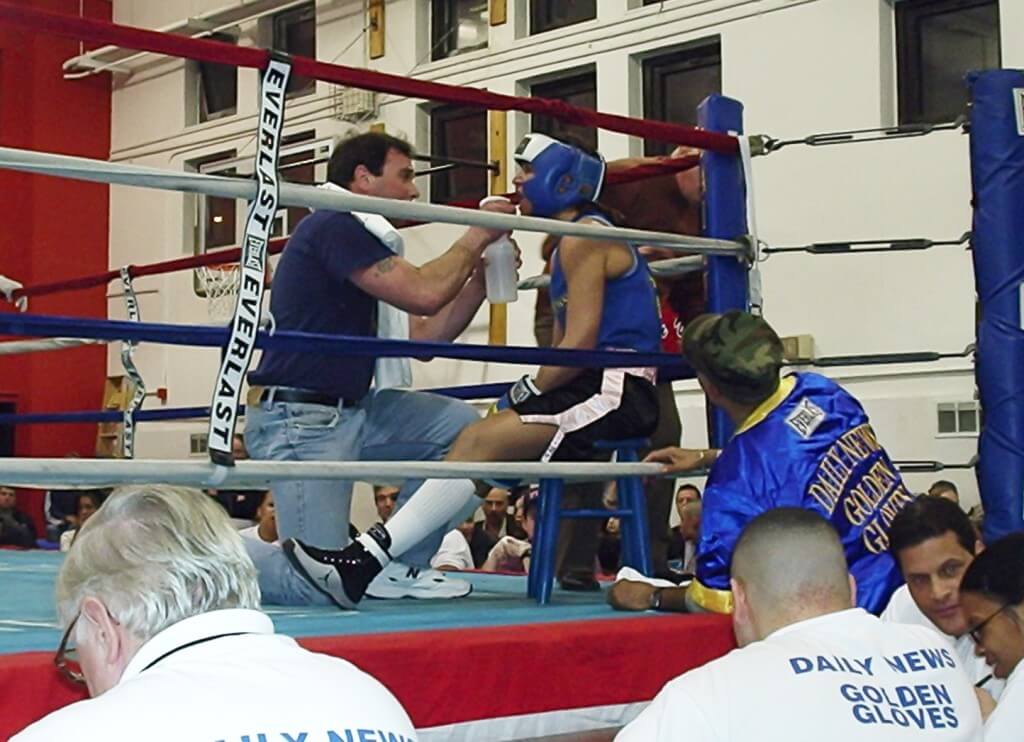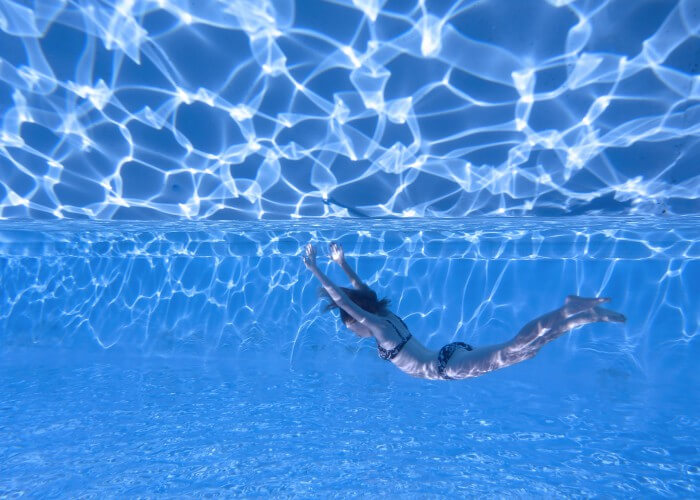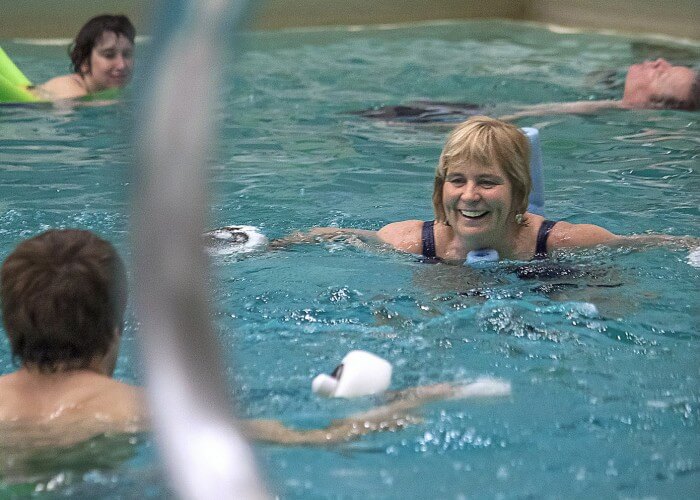Healing in the Pool: A Journey to the Ring After Back Surgery

ATHENS, OH- Seldom do those immersed in water for so much of their lives stop to appreciate the revitalizing qualities of the pool. Dr. Laura Miele-Pascoe does not have a swimming background, but after undergoing back surgery and needing to be in boxing shape in three months time, Miele-Pascoe befriended the water.
Her recovery from surgery was accelerated by the water’s many healing benefits. Below she shares how the pool allowed her to smoothly transition from bed rest in a hospital to the best fighting shape of her life.
By Dr. Laura Miele-Pascoe, Contributor
Post-Surgery Realization
In December of 2003, I underwent spinal surgery to correct two herniated discs and remove scar tissue from a surgery ten years prior. Thirteen weeks later, I had to fight in the semifinal of the Golden Gloves boxing tournament in New York City.
I am a natural competitor. I have participated in many high level competitive sports including NCAA Division I basketball, semi-pro football, Golden Glove amateur boxing. My journey from under the scalpel into the ring was one of the hardest bells that I had to ever answer in my athletic career, and it was only possible by building a carefully-crafted pool rehabilitation and an aqua training circuit.
As with many athletes, being confined to bed rest after my spinal surgery was not easy. Almost immediately, I began working to maintain my arm strength as I recovered. Lying in a bed with a back brace, I began exercising by throwing hundreds of punches using five-pound hand weights.
While I was anxious to get back on my feet to train for my upcoming fight, I had a plan in place. I would endure three weeks of near-complete bed rest apart from some arm exercises to facilitate the healing process. I knew after forcing myself to allow for healing, I could rehab early and intensely.
After three weeks of healing, I began working myself back to my feet. Even though I was prepared for leg weakness after surgery and bed rest, I was still shocked by how quickly I had lost the strength in my legs. I knew the only way I could rehabilitate myself back to strength for the Golden Gloves match was in the pool.

Photo Courtesy: Backpacker01, flickr
The Pull Towards Pool Therapy
The pool was the optimal place for my rehabilitation for a few reasons. The first being weightlessness. I could work on my legs, arms and chest while applying close to zero pressure on my lower back and abdomen. Wearing a floatation belt buckled around my waist took the stress off my abdominal muscles and my joints.
I would not have been able to train without this weightlessness. I would not have been able to withstand the weight. Eliminating gravity from the situation and maintaining a perfectly buoyant state allowed me to focus a great deal on which muscles I was using for each exercise.
On land, without this high level of control, I could have lost balance and hurt myself or overworked myself too early, taking a few steps back in the recovery process. Although I did have to participate in weeks of physical therapy, my favorite place was in the water.
My second pull towards pool therapy was the natural resistance of the water. I was able to do a variety of resistance exercises while maintaining a buoyant state. Under water, it took more energy to make minor movements.
I was able to build my lung cardiovascular and muscle endurance by working my own strength against the natural resistance of the water. After the surgery and bed rest, these minor movements in the water was exhausting. This decision to compete so closely after my surgery was a definite uphill battle. But it was one I was ready to fight.
Submerging Myself in Movement
Being in the fragile recovery state that I was, I felt a certain calming sense of security being submerged in a pool. Out of the water, each step was a challenge with every movement potentially shooting pain through my back and down my legs. By carefully building the reps and duration of exercises, I created a personal exercise circuit, which included:
Jogging forward
Back peddling
Side stepping
Standing leg kicks
Underwater punching
Bicep curling
With a floatation belt firming buckled around my waist, I would swim breaststroke across the pool using my arms only. Using a pull buoy to help support my legs, these laps built both my arm strength and my cardio as well as helped to stretch out my back. I could only manage a lap or two at first, becoming exhausted quickly. I attempted to use a kickboard but found that it applied too much pressure to my lower back and abdomen.
This pool rehabilitation was a painfully delicate process that required a large amount of patience on my end. I was fortunate that I was in peak physical condition before the surgery. My core strength did not deteriorate too much during the process.
Granted my legs did still feel like jelly during the Golden Gloves fight, but it would not have been possible to participate in that fight if it was not for my carefully-crafted pool therapy strategy, awesome boxing trainer, and a good friend.
Pool Therapy and Training Across Athletics
Through my experience as an athlete, personal trainer, sports psychology consultant and professor at Ohio University, I view the pool as a highly beneficial supplement to training across all sports and a priceless tool to effective athlete rehabilitation.
Based on my experiences and research as a professor of the Masters in Coaching Education program at Ohio University, I recommend pool therapy for any type of conditioning. It is an optimal way to condition the body and take the weight and pressure off of the joints.
Each athlete that I have come across can benefit from time in the pool following a strength and conditioning regimen that is tailored for him or her. The resistance, control, and low impact nature of pool training can have nothing but beneficial effects on the health and performance of an athlete.
About the Author

Dr. Laura Miele-Pascoe is an expert in fitness, sport and recreation with specific expertise in sports psychology, personal training, fitness facilities management/operations, and injury prevention. She is an accomplished athlete as well as an experienced trainer, coach and teacher. Dr. Miele played Division I basketball at Arizona State; was Tight End for the Arizona Caliente, of the Women’s Professional Football League; and was also a New York Golden Gloves semi-finalist in 2004. She began coaching athletes in 1986 and has been involved as a personal exercise and fitness trainer since 1994.
Dr. Miele holds a Doctorate in Sport Psychology, a Master’s in Education: Alternative Education/Minor: Education Administration and an undergraduate degree in Exercise Science and Physical Education. She was a middle school and high school Physical Education teacher from 1997 to 2006, and then returned to education from 2011 to 2014 after managing the Sport Injury Prevention Program for a Children’s Medical Center. Dr. Miele continues to consult schools, athletic directors, coaches, parents, and student-athletes on the importance of preventative tactics in sports.





Laura, once again another excellent article. I have been a strong proponent of hydrotherapy for my 45 years in the sports medicine business. It is not only great for rehabilitation, but also for conditioning with its’ non-weight bearing properties. The stress reduction on the body allows for quicker results as well as for less muscle soreness and fatigue of other resistance programs. But at the same time it provides a workout that can safely push you to your limitations. Your article was not only well- written, but also clear, concise and not full of confusing scientific/ medical terminology. Another outstanding job Laura.